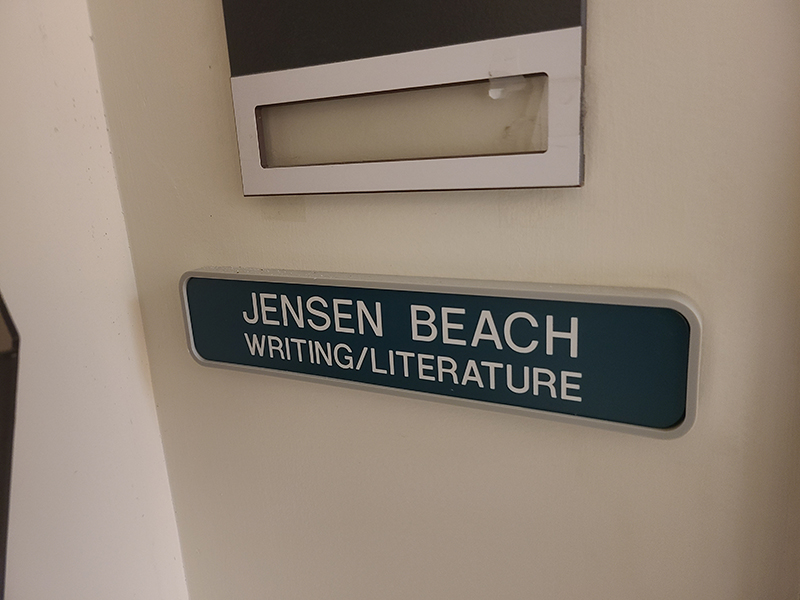Two finalists, Sodexo and ARAMARK, are competing for the $6 million-a-year food service contract to be awarded by the Vermont State Colleges at the end of February.
Currently, ARAMARK is finishing up a 10-year contract with the four campus based state colleges Johnson, Castleton, Lyndon and Vermont Technical College, which expires in June.
According to JSC Dean of Administration Sharron Scott, ARAMARK has been VSC’s food service provider for the last 30 years. “It’s been a long time,” she said. “We decided that this year we would have a competitive program for evaluating food service suppliers. It had been quite a while since that had been done within the VSC and we thought it would be a good opportunity for us to review contractual terms and make sure that the colleges were getting the best deal for our students.”
A request for proposal was developed last fall, and the VSC invited food service providers from around the country to offer their proposals. The proposal that was issued is a recommended contract for five years with a possibility for renewal for another five. The terms will be worked out during the final negotiations in March.
From the original five companies competing, Chartwells, CulinArt and the local Abbey Group, the field was narrowed down to Sodexo and ARAMARK.
Assistant Dean of Students Michele Whitmore, a member of one of the teams of people from each college asked to help with the search, has appreciated the process: “I feel it has been a thorough process thus far. I enjoyed reviewing the proposals from various food service companies and appreciated being heard from other committee members when providing student information.”
Both companies gave presentations to the teams from each college at VTC on Jan. 17. “We have interviewed food service director candidates from both companies to determine how we thought their candidates may fit in with our environment,” said Scott.
Representing the Johnson State College committee is Scott, Whitmore, Danielle Spring, director of Conference and Events Services, VSC Student Government Association Vice Chair Ira Tillberg and SGA President James Dempsey.
As a member of the Student Services Division, Whitmore was asked by Scott to be a part of the team. “I am glad to be part of this process and feel it is important to share positive and negative feedback and suggestions received from students regarding their dining experience,” she said. “Students have a voice in this process and should feel welcomed to provide input to either me or SGA President James Dempsey.”
Another member of the committee, student Ira Tillberg, is concerned with how either company will be held accountable for the services they are offering. According to Tillberg, one similar proposal between both companies was the use of more local food. “How are we going to hold them accountable to these plans?” he asked. “What’s the follow through going to be? Vermont has a five-month growing season. How realistic is it to think that we can get a significant amount of local food here when all the local food is grown in the summer? It’s really not a matter of who we choose; it’s a matter of them being accountable for what they are going to do.”
VSC Chancellor Tim Donovan indicated that the eventual contract will contain compliance provisions.
In the next few weeks both companies will provide a best final offer, which will incorporate all the feedback they have learned about the VSC since the original proposal. This step Scott says will provide the companies the chance to offer a best and final proposal for both the services they would like to provide and the pricing.
The VSC developed a dining services RFP process using numerical rankings to establish criteria. The criteria are primarily based around each company’s ability to be able to meet their proposal requirements within three major areas:
The Management Team, the director candidate, district manager, and supporting regional team;
The Programs, dining, retail, and catering programs, how each company embraces JSC’ mission, vision and values, what is the annual process used to give students a new dining experience, their sustainability program and employee development training;
Financial, the total annual contractor costs.
Each category is weighted based on its overall importance to the contract and points are given for each category.
After examining the offers, each team of individuals having reviewed the proposals thus far will make a recommendation to the Council of Presidents, which will make the final decision by the end of February.
Negotiations will occur in March followed by transition planning, which will take place in April, May and June. If the VSC does make a switch from ARAMARK to Sodexo, the changeover would occur sometime in June and when students return in the fall there would be a new food service provider. Otherwise, a new contract term would begin with ARAMARK.
Scott agrees that both companies are very interested in working with the VSC. Sodexo and ARAMARK are international companies; between the two companies they contract about two thirds of the food service market for higher education. “They are very, very, large companies,” she said. “They brought excellent teams and presentations to the table and some really creative, interesting ideas for how they would like to proceed. Both companies offered really great proposals and they did have some very significant differences, both of which were really very interesting.”
No matter which company wins the contract, changes are in store. “There are going to be transitions regardless of which company we choose to go with,” Scott said. “In each case both companies are offering new and different ideas that require some work to be done. There may be refurbishment. There could be retraining of staff so that they could do things a different way. It could be setting up new programs or other things that are going on. In both situations there will be tasks to do.”



